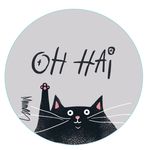- Home
- Photoshop ecosystem
- Discussions
- Re: Erasing background noise from scanner
- Re: Erasing background noise from scanner
Copy link to clipboard
Copied
Hi guys,
I've faced this issue for years now in photoshop and wondered if any one had a hack.
So I scan my watercolour artwork and upload it in photoshop. The light from the scanner combined with the texture of my paper creates shadowy 'noise' in the white background of my artwork. *See 1st image*.
So in order to have clean white background I have to chop up the existing background using the lasso tool. *See 2nd image* and erase it so it doesn't print with any noise. As i do quite intricate work this takes hours. I've used levels but it reaches a point where it starts taking away from my artworks colour if I pull back to far to get a clean white background.
I really wish there was a way to select only the painted area and erase the entire background. I know the magic wand tool can do this but it takes the fine edge off my painting. Any ideas from the Brains trust? Much appreciated!!
 1 Correct answer
1 Correct answer
The problem is the paper texture in one-directional light.
You could scan it twice, one turned 180 degrees. Then stack them with the top one in "Lighten" blend mode. But I doubt you could get them to align perfectly - few flatbed scanners are that precise. There's usually a random "warp" probably caused by variations in scanner head movement.
What you need to do is not scan, but photograph them. You need two light sources, positioned at 45 degrees to each side. This is a standard art repro s
...Explore related tutorials & articles
Copy link to clipboard
Copied
Sometimes the Brightness/Contrast slider can help. Is the banding I'm seeing part of the painting, or is that artifacts?
Copy link to clipboard
Copied
Thank you!! The banding is just the effects of photographing the computer screen.
Copy link to clipboard
Copied
It looks like "moire" where the grain of the paper interacts with the scanner array. My cure was to overscan at 1200 ppi, the max optical resolution for my scanner, then downscale in Photoshop to 300 ppi.
And I second "setting the points." https://www.scantips.com/simple2.html
The scantips website is a good primer to making great scans.
Gene
Copy link to clipboard
Copied
Thanks Gene!
I will try that!
Copy link to clipboard
Copied
I recommend that you clean your scanner. It looks like a finger print.
Copy link to clipboard
Copied
Thank you for your reply. It actually is just the effect of photographing the screen for this post, I'll try to capture the problem area more clearly.. thank you, it's probably worth cleaning the scanner anyway.
Copy link to clipboard
Copied
I very much recommend iKlear for screen and scanner cleaning.
https://cdn.shopify.com/s/files/1/0734/9357/files/iklear-en.pdf
Amazon has it.
Copy link to clipboard
Copied
To me it look like you snapped a picture of your screen which has poor quality. Post a screen capture instead so we can get an idea of what your scans look like.
Copy link to clipboard
Copied
Great idea thank you!!
Copy link to clipboard
Copied
So i uploaded those screen shots, any ideas? Thank you!
Copy link to clipboard
Copied
What I see look like it could be the paper texture more than noise. What kind of paper do you use when you waterpaint. If you us a lot of noise reduction on it you will lose details in the painting
Copy link to clipboard
Copied
The problem is the paper texture in one-directional light.
You could scan it twice, one turned 180 degrees. Then stack them with the top one in "Lighten" blend mode. But I doubt you could get them to align perfectly - few flatbed scanners are that precise. There's usually a random "warp" probably caused by variations in scanner head movement.
What you need to do is not scan, but photograph them. You need two light sources, positioned at 45 degrees to each side. This is a standard art repro setup.
The tricky part is finding something to use as a repro stand. Some tripods have a center column with a "hinge" that can be laid horizontally as a boom. Ask in your local camera shop. If you can mount the original on the wall it gets a lot easier of course.
Make sure to position the lights so that you get even distribution and avoid reflections. This can be more or less difficult depending on circumstances, but normal matte watercolor paper in standard sizes shouldn't present any problems.
Copy link to clipboard
Copied
Yes a high quality picture with proper lighting and your camera on a stand so it is centered over the painting and parallel to it. If off a perspective crop will help with the perspective distortion
Find more inspiration, events, and resources on the new Adobe Community
Explore Now



